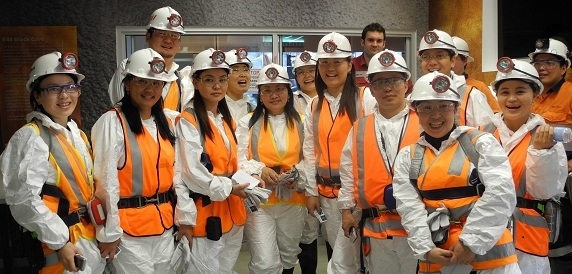Programs

Mongolian journalists commit to mining transparency
June-August 2012
Twelve journalists have returned to Mongolia from an APJC program with a resolve to make the mining sector in their country more transparent to public scrutiny.
The journalists, who came from broadcast and print media mostly in Ulaanbaatar, attended a six-week program on how to strengthen news coverage of the burgeoning mining sector in Mongolia, including its social and environmental impacts.
The underlying theme of the program, called Media, Mining and Communities, was to explore how Australian practice in mining and journalism can help Mongolian news media analyse and report more effectively the mining sector in their society, promoting development that is more shared and sustainable.
Supported by AusAID under its Australian Leadership Awards (ALA) Fellowships scheme, the program was run in partnership with the Press Institute of Mongolia, with which the APJC has a four-year association.
At the APJC in Melbourne, the journalists attended a leadership program followed by a workshop on reporting mining and economic issues that included briefings from award-winning journalists on investigative journalism, the use of freedom of information laws, and the development and application of professional codes of conduct for journalists.
They then attended a three-day seminar at the Centre for Social Responsibility in Mining (CSRM) at the University of Queensland, covering policy development and regulation, water management, community health, indigenous and gender concerns, and remote work practices in the mining sector.
At Parkes in New South Wales, the fellows visited an underground gold and copper mine operated by Rio Tinto, which has investment in the largest mining operation in Mongolia.
In a program of professional visits in Melbourne, Brisbane and Sydney, the journalists met a range of people with an interest in mining issues, including political actors, academics, miners, indigenous leaders and representatives from trade unions, think tanks, NGOs and the news media.
They also spent several days working with and observing the operations of newspaper, radio and television organisations in Melbourne.
APJC Fellows:
Mr Adiyakhuu Batbazar, foreign news editor, Montsame News Agency
Ms Undrakhjargalant Batdorj, reporter, NTV media group
Ms Sevjidmaa Batjargal, reporter, Ardchilal daily newspaper
Ms Enkhtuya Batsuren, program department chief, Emerge Media LLC
Ms Sansarmaa Battulga, program director, Family Radio 104.5 FM
Ms Narantungalag Enkhtur, anchor, NBS Television
Ms Ariunzaya Gankhuyag, international news translator, Channel 25
Ms Ulziisaikhan Geldee, head of business news, Mongol news media group
Ms Gunjidmaa Gongor, head of research, Press Institute of Mongolia
Ms Otgonjargal Ish-Ochir, executive editor, Mongolian Economy magazine
Mr Erdenebulga Namnansuren, world news editor, Shuud TV Broadcasting company
Mr Byambatogtokh Tumen-Ulzii, station manager, Family Radio 104.5 FM